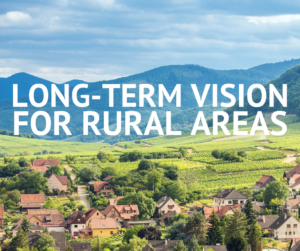 Today, the European Commission published its Long-Term Vision for Rural Areas . Euromontana has been advocating for a long time for a European Rural Agenda that would take into consideration the specificities of the different types of rural areas, including by supporting the 2016 resolution initiated by the former RUMRA intergroup of the European Parliament. In continuation, Euromontana was actively involved in the reflexion around the Long-Term Vision for Rural Areas as member of the ENRD expert Thematic Group, by meeting with European Commissioners and by providing recommendations during the public consultation (read our contribution Long-Term Vision for Mountains’ Rural Areas).
Today, the European Commission published its Long-Term Vision for Rural Areas . Euromontana has been advocating for a long time for a European Rural Agenda that would take into consideration the specificities of the different types of rural areas, including by supporting the 2016 resolution initiated by the former RUMRA intergroup of the European Parliament. In continuation, Euromontana was actively involved in the reflexion around the Long-Term Vision for Rural Areas as member of the ENRD expert Thematic Group, by meeting with European Commissioners and by providing recommendations during the public consultation (read our contribution Long-Term Vision for Mountains’ Rural Areas).
“30% of Europeans live in rural areas and 13% in mountain areas, it was urgent to act at European level to tackle the main challenges we face” welcomed Juanan Gutiérrez, President of Euromontana “The Long-Term Vision for Rural Areas brings some progress, so Member States now have to seize the new tools to help to create the enabling conditions for vibrant, attractive, and resilient rural mountainous areas”.
A Rural Pact and a Rural Action Plan
The Long-Term Vision for Rural Areas is promising and shows a political will to further promote and accompany rural areas to overcome their challenges and unlock their potential. A Rural Pact and a Rural Action Plan are also elaborated.
The proposed Rural Pact should mobilise all rural stakeholders, from local authorities to associations and citizens, and facilitate the exchange of experiences and replicable initiatives to boost rural revitalisation. Under the Rural Pact, the European Commission will also encourage Member States to adopt rural agendas at national, regional, or local levels – as already done in France or Catalonia – which is a positive signal towards placed-based territorial approaches.
The Commission’s communication also brings forward an EU Rural Action Plan, a set of measures which will support rural development around 4 main axes. Euromontana is pleased to see that some of its recommendations were translated in the EU Rural Action Plan. Among the measures announced in the Rural Action Plan, Euromontana especially welcomes the creation of a “Rural revitalisation platform”, a new online one-stop shop for rural areas, as well as the intention to provide more support to rural entrepreneurship and skills, especially in sectors like the bioeconomy, circular economy, and social economy.

Remaining loopholes for full effectiveness
The Long-Term Vision for Rural Areas responds to some of the long-standing demands of Euromontana and the European Commission’s political intention to address rural challenges is to be welcomed. Yet, we can regret the absence of concrete measures on crucial issues for territorial attractiveness of mountain areas, such as Services of General Interest, a real ambition for improving mobility and education facilities. Moreover, some proposed measures do not seem to take into account the diversity of rural areas, not all of which are located within the functional area of an urban centre.
All in all, this Vision does not bring real new instruments or funds to support rural areas and the European Commission rather insists on already existing measures and networks. This Vision will be implemented during the 2021-2027 period and Euromontana regrets that it must therefore perform within the limits of the already adopted budget and programmes. The publication of this Vision in June 2021 is a real missed opportunity to include its priorities both in the CAP Strategic Plans, in the Operational Programmes of the Cohesion Policy but also in the Recovery Plans of the Member States, which are already finalised.
It is also regrettable that post-pandemic opportunities are not further explored in the Vision. The COVID-19 crisis has shown a desire to return to rural areas and has highlighted the potential of teleworking. However, this does not reflect the reality of all rural areas and workers, and a trend reversal will only happen if these areas are attractive, provide services, and offer employment and education opportunities, including in the most remote areas.
The European Commission also reaffirms the need to implement a rural proofing mechanism without providing further details on how it intends to concretely assess the impact of major European policies on rural areas. The rural proofing of policies was a key recommendation from the Cork 2.0 Declaration in 2016 and is a repeated demand from Euromontana and other rural networks like the European Countryside Movement. Yet it was never really implemented so far at EU level and Euromontana will remain attentive to its implementation in the future.
Moreover, if the European Commission announces a first evaluation of the Rural Action Plan’s implementation by mid-2023, no indicators were set. Euromontana will therefore remain attentive to how the progress made will be monitored and calls for the publication of a clear set of indicators.
30 June 2021









